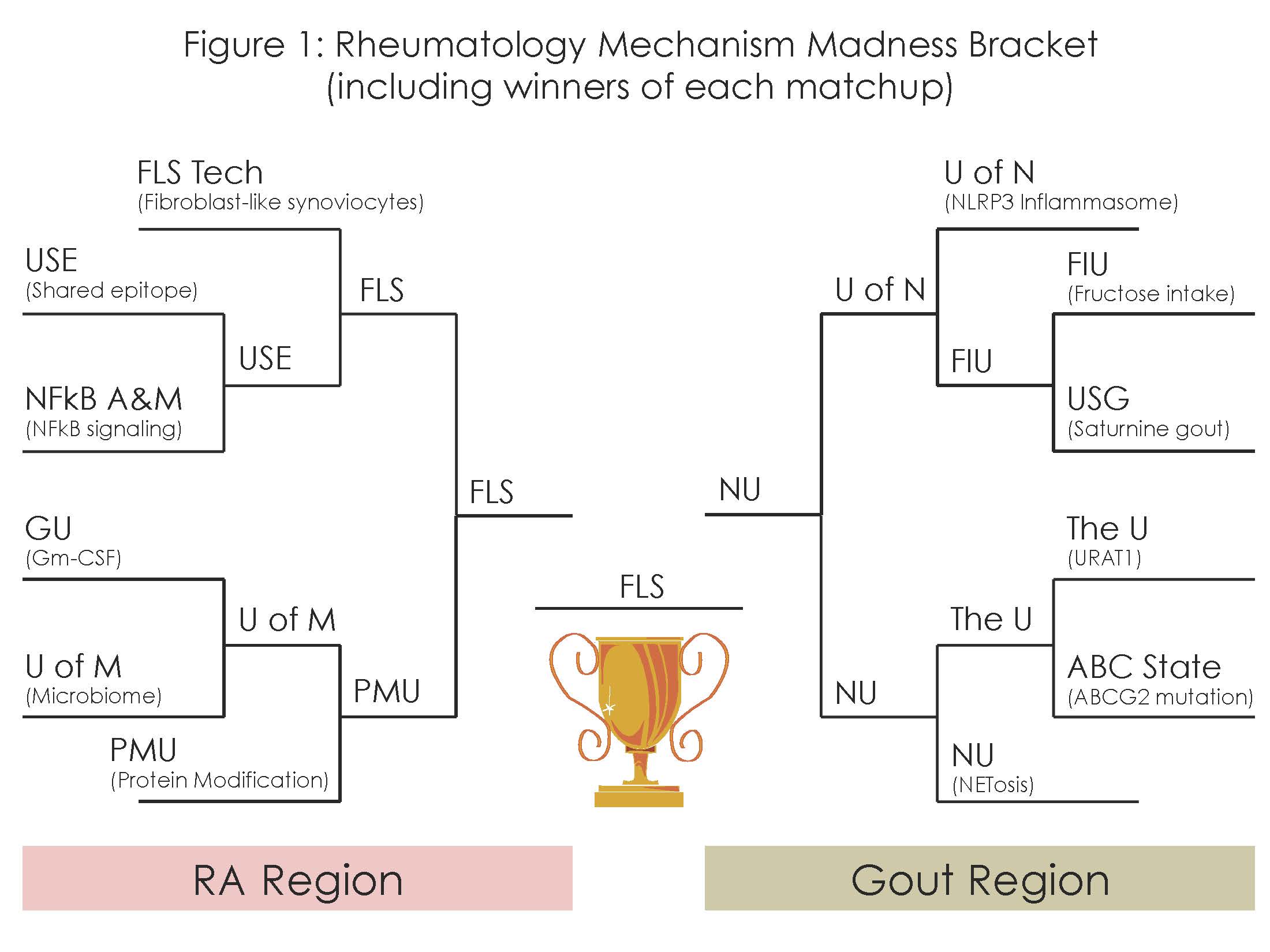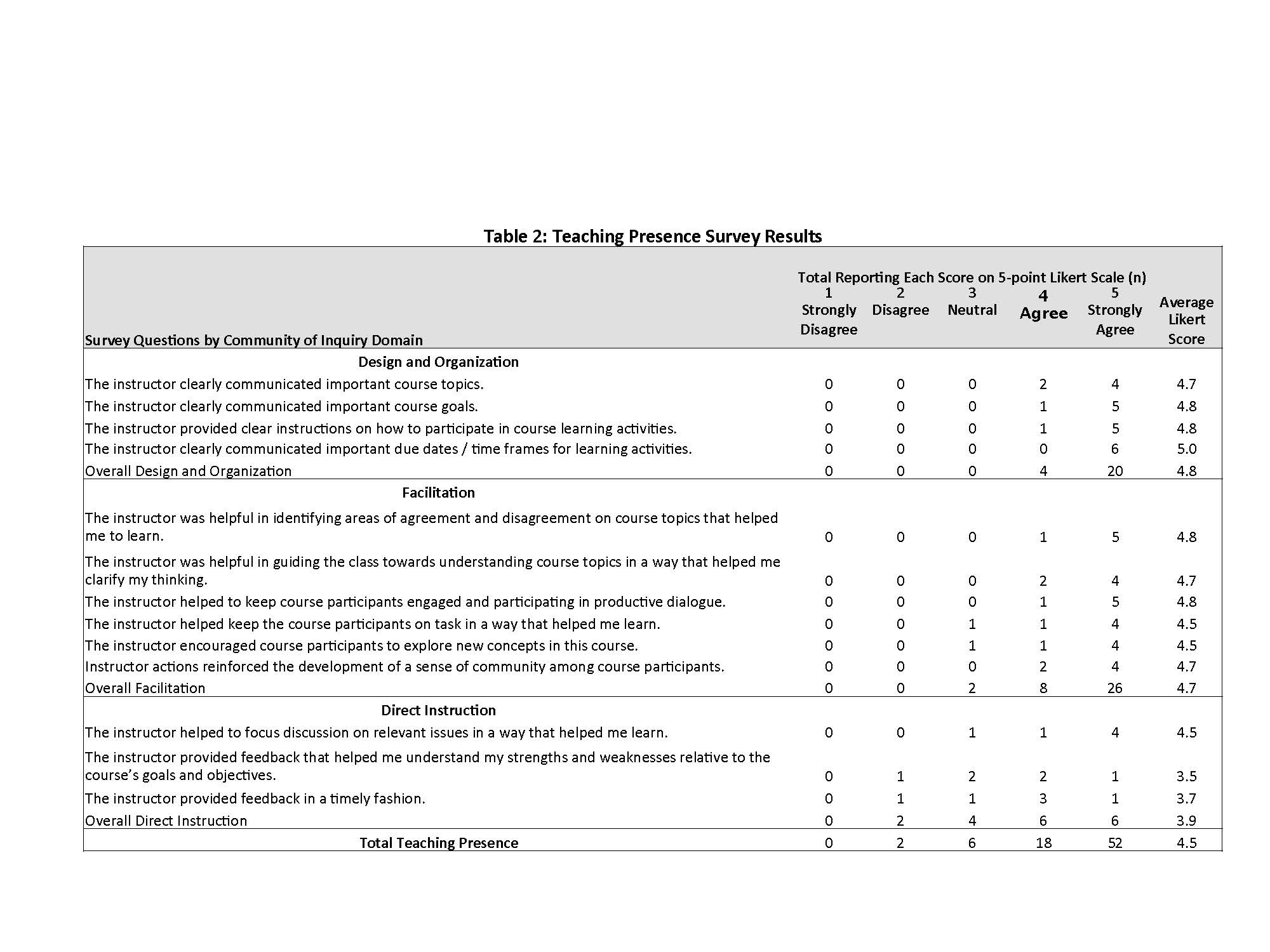Session Information
Date: Monday, November 11, 2019
Title: 4M089: Education (1794–1799)
Session Type: ACR Abstract Session
Session Time: 2:30PM-4:00PM
Background/Purpose: The Community of Inquiry (CoI) is a framework to understand how a group of individuals learns together and includes concepts of social, teaching, and cognitive presences. Inspired by the popular NephMadness online educational tournament that mimics the NCAA “March Madness” basketball tournament, we piloted Rheumatology Mechanism Madness (RMM) at our institution. Our primary goals were to test feasibility and assess the activity’s educational impact using the CoI framework.
Methods: In two core curriculum sessions, fellows together identified and chose key disease mechanisms in RA and gout to include as individual “teams” in the RMM bracket. Fellows then wrote half page “scouting reports” reviewing each mechanism and presented topic overviews at one divisional grand rounds. The Division was invited to complete brackets and attendees voted for the winner of each matchup during grand rounds. We reviewed metrics on tournament engagement and distributed a modified validated CoI survey to the fellows who participated in RMM. In the CoI survey, cognitive presence describes learners’ progression through four stages of cognitive processing: triggering, exploration, integration, and resolution; teaching presence describes the oversight of the learning activity. Our modified CoI survey included questions relating to the cognitive and teaching presences but omitted social presence as our fellows had already developed a social community. Each question was rated on a 5-point Likert scale (1 = strongly disagree, 2 = disagree, 3 = neutral, 4 = agree, 5 = strongly agree). Data was analyzed using descriptive statistics.
Results: Fellows created a bracket with 12 mechanisms related to RA and gout (Figure 1). Out of 32 possible participants in our division, 19 (59%) submitted a bracket. The winning pathogenic mechanism was fibroblast-like synoviocytes in RA, and one participant correctly predicted every matchup outcome. All 6 fellows who participated in RMM responded to the post-survey. The average Likert score for questions relating to the cognitive presence was 4.1; subdomain scores were: triggering 4.6, exploration 3.9, integration 4.2, and resolution 4.1 (Table 1). The average Likert score for questions relating to the teaching presence was 4.5; subdomain scores were: design and organization 4.8, facilitation 4.7, and direct instruction 3.9 (Table 2). Every respondent agreed or strongly agreed that they enjoyed RMM (average score 4.7) and would be interested in participating in a future version that included fellows from other institutions (4.7).
Conclusion: The pilot RMM activity was feasible and enjoyable for fellow participants. CoI survey results provided evidence of effective cognitive and teaching presences within the activity. In the cognitive domain, this activity was most effective to trigger interest, and least effective in knowledge applicability. Next steps include adapting the initiative to include trainees at other institutions, adding steps to enhance applicability and further evaluating the CoI framework as a tool for studying this initiative, including the social presence.
To cite this abstract in AMA style:
Leverenz D, Criscione-Schreiber L. Rheumatology Mechanism Madness: A Pilot Collaborative Learning Activity for Rheumatology Trainees [abstract]. Arthritis Rheumatol. 2019; 71 (suppl 10). https://acrabstracts.org/abstract/rheumatology-mechanism-madness-a-pilot-collaborative-learning-activity-for-rheumatology-trainees/. Accessed .« Back to 2019 ACR/ARP Annual Meeting
ACR Meeting Abstracts - https://acrabstracts.org/abstract/rheumatology-mechanism-madness-a-pilot-collaborative-learning-activity-for-rheumatology-trainees/



